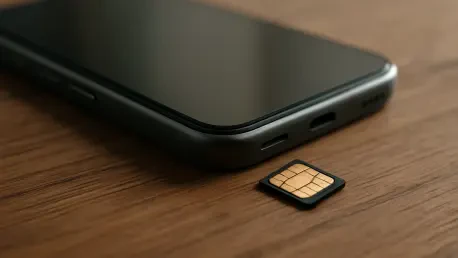In a rapidly evolving technological landscape, Vodafone stands out as a formidable force in the Internet of Things (IoT) domain, demonstrating strategic agility and innovation. By transforming its IoT enterprise into a standalone entity, the company makes a calculated move to enhance operational speed, scalability, and flexibility, allowing it to address the complexities present in the global market. This strategic maneuver coincides with advancements in eSIM and iSIM technologies, which are poised to revolutionize connectivity options for IoT solutions worldwide. Vodafone’s commitment to pioneering eSIM standards not only positions it as a leader but also as a facilitator for seamless international IoT deployments, meeting a growing demand for simplified yet advanced connectivity frameworks.
The Evolution of Vodafone IoT
Strategic Reorganization and Independence
Vodafone’s decision to reorganize its IoT business unit and operate it as an independent entity marks a pivotal moment in its journey. By choosing this path, the company aims to inject greater agility and nimbleness into its operations, crucial for navigating the diverse technological and regional requirements present in today’s IoT market. Erik Kling, who leads Vodafone IoT across the Americas, emphasizes the importance of this independence, highlighting its role in enhancing scalability, fostering innovation, and adapting swiftly to technological advancements. By becoming an independent entity while remaining under the Vodafone Group umbrella, the IoT unit is better positioned to respond to global demands, leveraging investments in platform development and embracing the transformative potential of eSIM and iSIM technologies.
The eSIM framework, particularly the SGP.32 eSIM standard, is central to Vodafone’s vision of an agile and globally accessible IoT platform. This innovation promises to streamline real-time tracking and monitoring, providing a simpler and more customer-centric experience. Vodafone’s active participation in standardization efforts aims to propel these deployments, ensuring they are equipped to cater to a worldwide audience. The excitement surrounding these advancements is palpable among company leaders, as they foresee significant impacts on IoT deployments, empowering clients with more flexible connectivity across various regions. This focus on client empowerment and simplification underscores Vodafone’s commitment to remaining at the forefront of IoT innovation.
Expansion and U.S. Market Strategy
Vodafone IoT’s strategy within the U.S. market is characterized by a comprehensive approach that emphasizes supporting enterprises with expansive global footprints. While direct domestic market engagement might not be the primary focus, the company’s robust outbound solutions and substantial support from local resources ensure a significant presence. The concept of “one SIM, one platform, one service,” operational since as early as 2010, highlights the depth of Vodafone’s integration and reach across international waters. This strategy is well-suited for IoT applications, especially in sectors like automotive, healthcare, and industrial settings, where the scale and regulatory requirements demand reliable and extensive connectivity solutions.
Despite not operating a native network within the United States, Vodafone’s advantageous positioning and local-global integration allow it to adeptly meet international connectivity needs. Enterprises seeking a stable global partner find Vodafone IoT to be a reliable ally, more focused on addressing nuanced demands from global footprints rather than solely catering to localized network solutions. Vodafone’s ability to navigate these dynamics underscores its strategic foresight and adaptability in a competitive landscape. By maintaining this strategic direction, Vodafone reinforces its role as a pivotal player in the broader IoT narrative, particularly in offering internationally coherent solutions that transcend geographical limitations.
Shaping the Future of IoT
The GDSP Platform and Competitive Edge
One of the cornerstones of Vodafone IoT’s offering is its Global Data Service Platform (GDSP), which serves as a cloud-based powerhouse facilitating unparalleled market capability. Over the years, this platform has consistently scaled to meet the demands of global enterprises, setting a benchmark for reliability and capability. Distinct from emerging global virtual network operators (MVNOs) and adapting to changing technological standards, Vodafone’s narrative consistently revolves around providing stability and confidence, prerequisites for sectors where operational reliability is vital. The company’s ability to assure global enterprises of dependable IoT solutions fortifies its position within the industry.
The GDSP platform offers a unique competitive advantage. Not only does it provide a robust foundation for comprehensive IoT solutions, but it also positions Vodafone as a trusted partner in ensuring seamless connectivity and data management across international boundaries. In an era where connectivity solutions are increasingly cloud-based and globalized, Vodafone’s advantage lies in its vast network ownership, offering unmatched regulatory and operational support. This extensive network infrastructure underpins Vodafone IoT’s ability to meet the diverse needs of its clients, strengthening its position against leaner MVNOs and asserting its leadership within the IoT market.
Innovation and Sustainability Initiatives
Innovation within IoT is not solely about technological advancements; Vodafone recognizes that sustainability plays an increasingly crucial role in shaping the future of IoT. The company views this nexus as an opportunity to streamline operations and reduce environmental footprints through IoT innovations. The potential for IoT to drive energy efficiency and reduce carbon emissions represents a critical aspect of Vodafone’s strategic focus. By embracing sustainable practices as part of its operational ethos, Vodafone seeks to contribute significantly to reducing global carbon footprints, with the overarching aim of achieving net-zero emissions by 2030.
Sustainability intertwines seamlessly with Vodafone IoT’s overarching strategy of pervasive digitization, as the company anticipates even greater energy conservation and lower carbon emissions. By instigating digitized solutions that yield environmental benefits, Vodafone not only aligns with broader corporate objectives but also appeals to enterprises that prioritize eco-friendly initiatives. The firm’s engagement with sustainability is deeply integrated into its vision, positioning Vodafone IoT as a leader not just in technological innovation but also in ecological responsibility. This multifaceted approach underscores the company’s commitment to addressing complex global challenges, setting a precedent for future enterprise strategies within the IoT ecosystem.
Vodafone IoT’s Path Ahead
Reinforcing Leadership Through Strategic Initiatives
Vodafone IoT exemplifies stability amidst the turbulence of the rapidly shifting IoT industry. By leveraging its extensive global infrastructure, the company has consistently demonstrated an ability to maintain unwavering platform consistency and embrace SIM innovation. The strategic separation from Vodafone Group, while maintaining full ownership, facilitates necessary agility to confront IoT challenges, seizing the opportunities presented by the eSIM and iSIM evolutions. Vodafone’s commitment to providing scalable and globally inclusive solutions is underscored by its emphasis on sustainability, aligning with a holistic corporate objective of achieving net-zero emissions.
As the IoT domain continues to evolve, Vodafone’s steadfast commitment to offering globally coherent solutions serves as a guiding force for enterprises seeking reliable and scalable connectivity. Positioned as a partner of choice for global enterprises, Vodafone IoT’s strategy resonates with the needs of clients intent on maintaining operational dependability and ecological responsibility. The company’s narrative, rooted in a relentless pursuit of leadership, is fortified by a focus on technological innovation and sustainability. As the IoT world undergoes continuous transformation driven by technological advances and market demands, Vodafone IoT remains well-equipped to navigate these changes, grounded in principles of environmental stewardship.
The Journey to Evolving IoT Ecosystems
Vodafone’s move to restructure its IoT business unit into an independent entity marks a significant milestone. This strategy is aimed at infusing more agility and flexibility into its operations, which is essential for meeting the varied technological and regional demands of today’s IoT market. Erik Kling, who heads Vodafone IoT in the Americas, stresses the value of independence, noting its critical role in scaling, fostering innovation, and quickly adapting to new technological developments. Operating as its own entity while still under the Vodafone Group umbrella allows the IoT unit to better cater to global needs, taking full advantage of investments in platform development and the innovative eSIM and iSIM technologies.
The eSIM, notably the SGP.32 standard, is a cornerstone in Vodafone’s pursuit of a nimble and worldwide IoT platform. This technology aims to facilitate streamlined real-time tracking and monitoring, enhancing the customer experience with simplicity and efficiency. Vodafone’s involvement in standardization is essential to extending these solutions globally, ensuring readiness for a wider audience. Company leaders are enthusiastic about these innovations, anticipating that they will significantly influence IoT deployments, offering clients more adaptable connectivity options across different regions. This emphasis on simplifying and empowering clients highlights Vodafone’s dedication to leading IoT innovation efforts.









